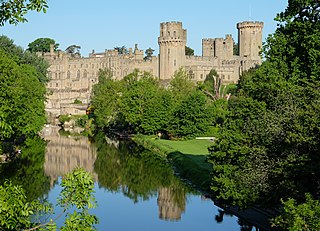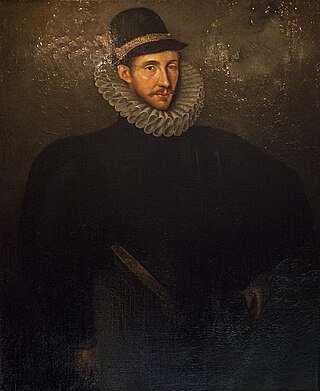Related Research Articles

Warwick Castle is a medieval castle developed from a wooden fort, originally built by William the Conqueror during 1068. Warwick is the county town of Warwickshire, England, situated on a meander of the River Avon. The original wooden motte-and-bailey castle was rebuilt in stone during the 12th century. During the Hundred Years War, the facade opposite the town was refortified, resulting in one of the most recognisable examples of 14th-century military architecture. It was used as a stronghold until the early 17th century, when it was granted to Sir Fulke Greville by James I in 1604. Greville converted it to a country house, and it was owned by the Greville family until 1978, when it was bought by the Tussauds Group.

Earl of Warwick is one of the most prestigious titles in the peerages of the United Kingdom. The title has been created four times in English history, and the name refers to Warwick Castle and the town of Warwick.

Fulke Greville, 1st Baron Brooke was an Elizabethan poet, dramatist, and statesman who served in the House of Commons at various times between 1581 and 1621, when he was raised to the peerage.
Warwick was a parliamentary borough consisting of the town of Warwick, within the larger Warwickshire constituency of England. It returned two Members of Parliament (MPs) to the House of Commons of England from 1295 to 1707, to the House of Commons of Great Britain from 1707 to 1800, and then to the House of Commons of the Parliament of the United Kingdom until 1885.

David Campbell Bannerman is a British politician who served as Member of the European Parliament (MEP) for the East of England from 2009 to 2019. He is currently Chairman of the Conservative Democratic Organisation and The Freedom Association. A member of the Conservative Party, he previously served as Deputy Leader of UK Independence Party (UKIP) from 2006 until 2010, when he was replaced by Paul Nuttall.

Robert Greville, 2nd Baron Brooke was a radical Puritan activist from Lincolnshire. A leading opponent of Charles I of England, when the First English Civil War began in August 1642, he was appointed Parliamentarian commander in Staffordshire and Warwickshire. He was killed by a Royalist sniper at the Siege of Lichfield on 2 March 1643.
John Edward Tomlinson, Baron Tomlinson was a British Labour Co-operative politician. He served as a life peer in the House of Lords from 1998 until his death, and had previously been a Member of Parliament from 1974 to 1979, and a Member of the European Parliament (MEP) from 1984 to 1999.

Barnett Janner, Baron Janner, was a British politician who was elected as a Liberal Member of Parliament (MP) and later as a Labour MP.

Francis Richard Charles Guy Greville, 5th Earl of Warwick, styled Lord Brooke until 1893, was a British Conservative politician.

Charles Guy Fulke Greville, 7th Earl of Warwick, 7th Earl Brooke, was a British peer and the last Earl of Warwick to live at the family seat Warwick Castle before its sale in 1978. He became the first British aristocrat to star in a Hollywood movie, and was later nicknamed the Duke of Hollywood by the local press.

Francis Greville, 1st Earl of Warwick, KT known as Lord Brooke from 1727 to 1746 and Earl Brooke from 1746, was a British peer. He inherited Warwick Castle and the title of Baron Brooke from his father in 1727. His education included time as a gentleman commoner at Winchester College. He was created Earl Brooke of Warwick Castle on July 7th, 1746 and became Lord Lieutenant of Warwickshire in 1749. He became a Knight of the Thistle in 1743. In 1759, he petitioned George II for the title Earl of Warwick when the last Earl of Warwick from the Rich family died. Francis' petition was granted, and Warwick Castle was once again held by the Earls of Warwick.

George Greville, 2nd Earl of Warwick, FRS, FSA, styled Lord Greville until 1773, was a British peer and politician. The eldest son of Francis Greville, 1st Earl Brooke, he was born on 16 September 1746 at Warwick Castle. He was baptised on 10 October 1746 at St. Mary's, Warwick, with King George II standing as his sponsor.

Leopold Guy Francis Maynard Greville, 6th Earl of Warwick, CMG, MVO, styled Lord Brooke between 1893 and 1924, was a British officer.
Francis Greville, of the Castle, Warwick, was and English Tory politician who sat in the English and British House of Commons between 1695 and 1710.

Hon. Ronald Henry Fulke Greville MVO was an English Conservative Party politician. He was Member of Parliament (MP) for Bradford East from 1896 to 1906.
The 1907 Kingston upon Hull West by-election was a parliamentary by-election held in England for the House of Commons constituency of Kingston upon Hull West on 11 November 1907.

Robert Knight (1768–1855) was an English reforming radical and Member of Parliament.

Elizabeth Greville, Countess of Warwick, formerly Elizabeth Hamilton, was the wife of Francis Greville, 1st Earl of Warwick, who was restored to the earldom of Warwick by King George III of the United Kingdom in 1760.
Charles Leigh (1686–1749) of Leighton Buzzard, Bedfordshire was a British politician who sat in the House of Commons between 1710 and 1734.
Dominick Ronanye was an Irish politician.
References
- 1 2 Stenton, Michael (1976). Who's Who of British Members of Parliament. Vol. 1. Hassocks: Harvester Press. p. 168. ISBN 0855272198.